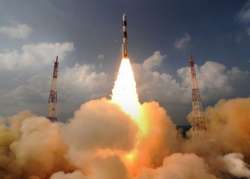Know about India's first Mars spacecraft 'Mangalyaan'
New Delhi: ‘Mangalyaan', India's first Mars spacecraft, on Wednesday morning entered into the orbit of the Red Plant almost after ten months.The Mars Orbiter Mission (MOM) was launched on November 5, 2013 by India's workhorse

New Delhi: ‘Mangalyaan', India's first Mars spacecraft, on Wednesday morning entered into the orbit of the Red Plant almost after ten months.
The Mars Orbiter Mission (MOM) was launched on November 5, 2013 by India's workhorse Polar Satellite Launch Vehicle (PSLV) from the spaceport of Sriharikota in Andhra Pradesh.
On a 666 million km journey, the spacecraft escaped the earth gravity pull on December 1, 2013.
Here, we take a look at the ‘Mangalyaan', India's step to explore the Red Plant:
Objective:
The 1.3-tonne Mars Orbiter Mission is carrying a Methane sensor. It will map the Martian surface, study the atmosphere and search for methane gas, a sign that the planet can support life.
Deep space communication, navigation, mission planning and management.
Incorporate autonomous features to handle contingency situations.
Payloads
Lyman Alpha Photometer (LAP): It is an absorption cell photometer which measures the relative abundance of deuterium and hydrogen from Lyman-alpha emission in the Martian upper atmosphere. Measurement will allow understanding the loss process of water from the Red Plant.
Methane Sensor for Mars (MSM): It is designed to measure Methane (CH4) in the Martian atmosphere and map its source.
Mars Exospheric Neutral Composition Analyser (MENCA): It is a quadruple mass spectrometer capable of analysing the neutral composition in the range of 1 to 300 amu with mass resolution.
Mars Colour Camera (MCC): This tri-colour MCC will give images and information about the surface features and composition of Martian surface. This will help scientists to monitor the dynamic events and weather of the planet.
Thermal Infrared Imaging Spectrometer (TIS): It will measure the thermal emission and will be operated during both day and night. It can also map surface composition and mineralogy of the planet.
A successful mission will make India the fourth in the world after the US, Russia and Europe to undertake a successful Mars mission.
India will also become the first Asian country to reach Mars if orbit insertion goes successful. Besides, India will be the first country to succeed in its maiden attempt.
It is also believed that a successful outcome of the Rs 450 crore mission will make India a stronger player in the space technology market.